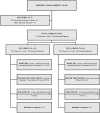Integrated Cognitive and Neuromotor Rehabilitation in Multiple Sclerosis: A Pragmatic Study
- PMID: 30271331
- PMCID: PMC6146227
- DOI: 10.3389/fnbeh.2018.00196
Integrated Cognitive and Neuromotor Rehabilitation in Multiple Sclerosis: A Pragmatic Study
Abstract
Background: Few studies examined the effects of combined motor and cognitive rehabilitation in patients with multiple sclerosis (MS). The present prospective, multicenter, observational study aimed to determine the efficacy of an integrated cognitive and neuromotor rehabilitation program versus a traditional neuromotor training on walking, balance, cognition and emotional functioning in MS patients. Methods: Sixty three MS patients were selected and assigned either to the Integrated Treatment Group (ITG; n = 32), receiving neuropsychological treatment (performed by ERICA software and paper-pencil tasks) complemented by conventional neuromotor rehabilitation, or to the Motor Treatment Group (n = 31) receiving neuromotor rehabilitation only. The intervention included two 60-min sessions per week for 24 weeks. At baseline and at end of the training all patients underwent a wide-range neuropsychological, psychological/emotional, and motor assessment. Results: At baseline the two groups did not differ for demographic, neuropsychological, psychological/emotional, and motor features significantly. After rehabilitation, only ITG group significantly (p-corrected for False Discovery Rate) improved on test tapping spatial memory, attention and cognitive flexibility, as well as on scales assessing depression and motor performance (balance and gait). A regression analysis showed that neuropsychological and motor improvement was not related to improvements in fatigue and depression. Conclusion: The present study demonstrated positive effects in emotional, motor, and cognitive aspects in MS patients who received an integrated cognitive and neuromotor training. Overall, results are supportive of interventions combining motor and cognitive training for MS.
Keywords: brain plasticity; cognitive motor interference; cognitive rehabilitation; multiple sclerosis; neuromotor rehabilitation.
Figures





References
-
- Amato M. P., Ponziani G., Rossi F., Liedl C. L., Stefanile C., Rossi L. (2001). Quality of life in multiple sclerosis: the impact of depression, fatigue and disability. Mult. Scler. 7 340–344. - PubMed
-
- Amato M. P., Portaccio E., Goretti B., Zipoli V., Ricchiuti L., De Caro M. F., et al. (2006a). The rao’s brief repeatable battery and stroop test: normative values with age, education and gender corrections in an Italian population. Mult. Scler. 12 787–793. - PubMed
-
- Amato M. P., Zipoli V., Portaccio E. (2006b). Multiple sclerosis-related cognitive changes: a review of cross-sectional and longitudinal studies. J. Neurol. Sci. 245 41–46. - PubMed
-
- Appollonio I., Leone M., Isella V., Piamarta F., Consoli T., Villa M. L., et al. (2005). The frontal assessment battery (FAB): normative values in an Italian population sample. Neurol. Sci. 26 108–116. - PubMed
LinkOut - more resources
Full Text Sources

